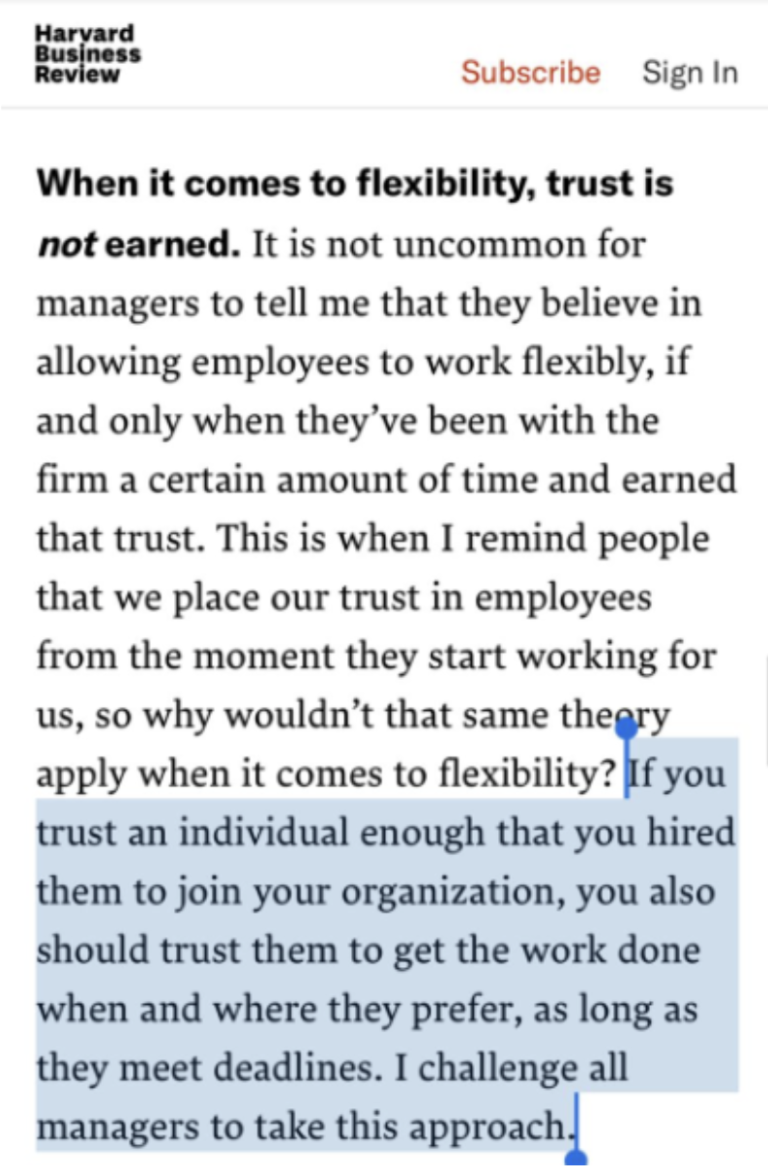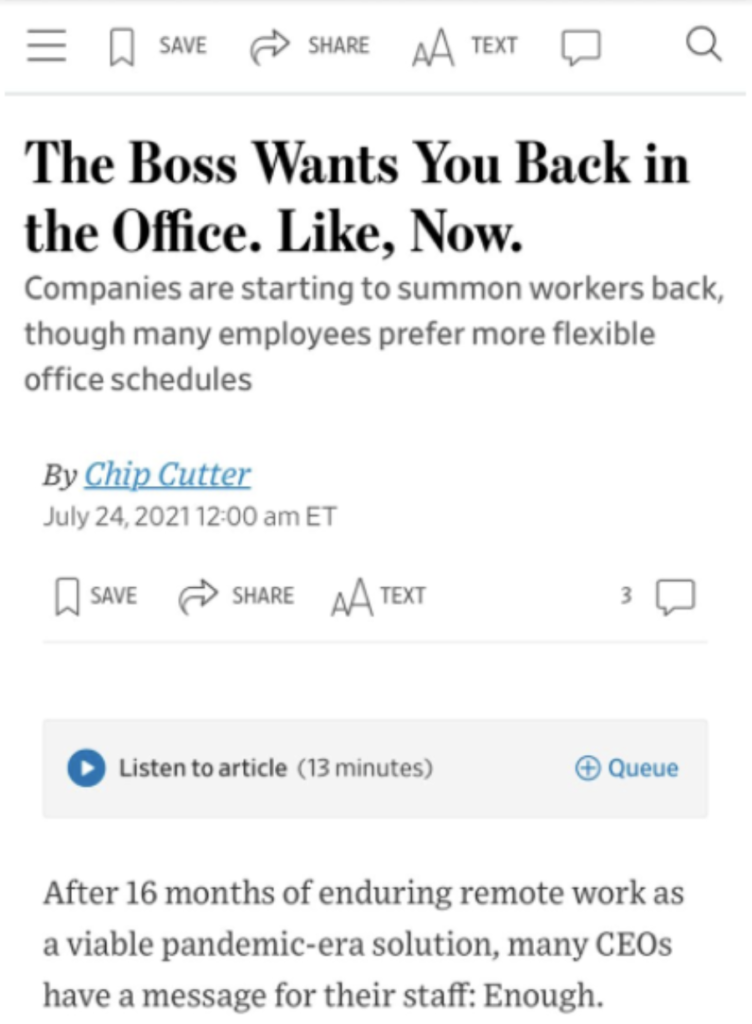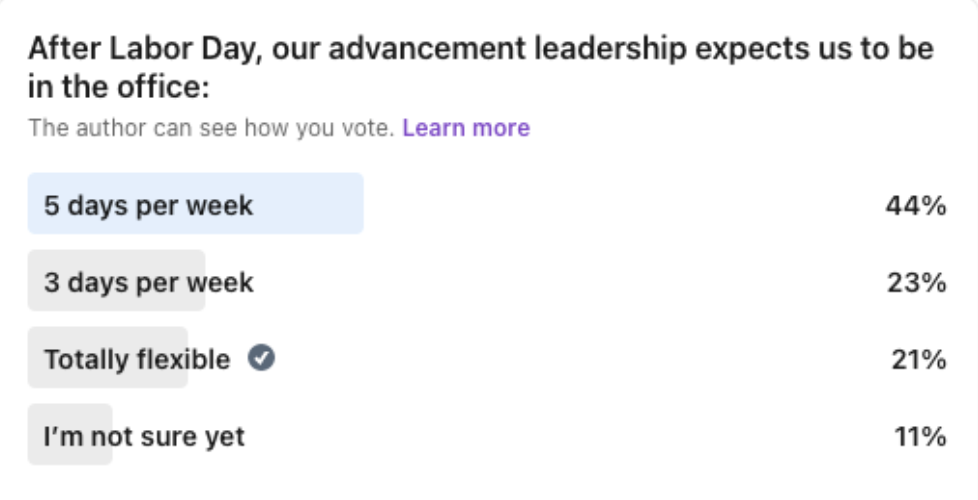It’s hard to deny that there’s a hole in the advancement talent pipeline:
- The average tenure for a gift officer is less than 18 months.
- 51% of all fundraisers plan to leave their jobs in the next two years.
- 3 in 10 gift officers plan to leave the field entirely within 10 years.
- Research shows that it costs $127,000 (or more) to replace a gift officer.
And now, with this fall’s nuanced return-to-work policies, talent retention will continue be one of advancement’s most urgent issues.
Even pre-COVID, remote work had exploded. Thanks to innovations in technology and a growing awareness of the importance of work-life balance, remote work grew by 159% from 2005-2020. From 2020-2022, it grew by 59%. In early 2020, 98% of all Americans said they’d want to work remotely at least some of the time for the rest of their careers.
The pandemic intensified and complicated, well..everything. Including the modern worker’s penchant for remote work.
Look at these few snippets. This doesn’t exactly add up to a win-win solution.
The truth is that advancement seems to be joining a number of other industries in the phase of The Great Resignation. To combat this, it’s going to take an industry-wide effort to “corner the market,” diversify and strengthen our teams, and make advancement a destination profession.
Cornering the market
By 2025, the majority of the modern workforce will be millennials. And here’s what millennials look for in a job:
- Good pay
- Benefits
- Work-life balance
- Innovation
- Growth
- Purpose
Currently, the demand for talented fundraisers far outweighs the supply. The only way that we can solve the talent pipeline is to make advancement a destination profession, and one that attracts and retains the best and brightest out there, and speaks to a majority-millenial workforce. In simplest terms, we have to corner the market.
Cornering the market means finding ways to attract, retain, and grow a talented and diverse workforce. It means providing compensation that can compete with a for-profit job offer. It means providing more flexibility and adaptability in work days. And it means setting up new hires to contribute immediately so that they can feel the joy and purpose that comes with advancement work.
John Morris is the Senior Vice President at Auburn University. He has transformed some advancement teams (like K-State’s) to be the most innovative in the game. He has recruited and retained some of the industry’s most talented and sought-after fundraising professionals. He has also seen lots of gift officer turnover, and he has been unafraid to ask why those folks left.
Take a few minutes and hear it straight from John.
Red flag: the reputation of the profession
As John points out, the reputation of our profession plays a huge role in our ability to attract, retain, and grow talented contributors.
How can we cure diseases, make degrees possible, and change the world if we can’t attract and keep the most productive, dedicated, talented staff who align with our mission?
We want advancement to be a destination profession. To that end, how we talk about our day-to-day matters. How we talk about donors matters. How we talk about our institutions matters.
At RAISE Live in July, we were joined by Melissa Korn, a Wall Street Journal reporter who covered the Varsity Blues scandal.
Aside from Melissa giving us the inside scoop on the scandal, (like what surprised her most, which universities turned down Rick Singer’s monetary bribes, and what institutions should learn from their counterparts who got swept up in the scandal), Melissa also reminded us about the importance of reputation.
Our alumni, our donors, and even our neighbors read big headlines like Varsity Blues. And it leads them to question the ethics of advancement work.
At EverTrue, we talk a lot about being in the fight for mindshare with our donors and alumni (i.e. you really can’t break through the busy inboxes with a snooze-fest fiscal year-end appeal). But it’s also really important to talk about our efforts to win the hearts of our alums.
After graduation, the only interactions many alums have with their alma maters are through the advancement and alumni relations teams. So, we are the university’s ambassadors.
In these gateway conversations, Melissa suggests engaging early in honest conversations with alums on topics like how the general annual fund dollars are used, the role gifts play in admissions (if any), and what percent of the endowment directly benefits students every year.
Speaking transparently about our profession will help to improve the public image of university advancement. And, it can help to draw talented alums to the profession once they see its unveiled value and potential for creating social change and improving access to education.
Each of us is an ambassador for our organization. We play a powerful role in protecting and upholding advancement’s reputation, especially when dealing with affronts like Varsity Blues.
Starting at home
At EverTrue, we have been really lucky to partner with dozens of institutions to launch Donor Experience programs over the past two years. We’ve worked with these institutions to attract diverse, bright, promising Donor Experience Officers to their teams. And then we help coach them as they cultivate portfolios of 1,000 prospects and make life-changing connections with previously disengaged donors.
Working hand-in-hand with these institutions who are willing to walk-the-walk to mend the advancement talent pipeline has been so meaningful for the whole EverCrew.
A winning example: Oregon State University
In 2019, OSU decided to solve their donor and dollar pipelines by focusing first on their talent pipeline. They were the first institution in the country to create an entry point for talented new fundraisers by hiring three Donor Experience Officers to join their team in Corvallis, Oregon.
The team of DXOs was so successful that OSU scaled the DX approach (high-tech, high-volume, highly-personalized outreach) to a team of seven seasoned fundraisers. And now they are seeing more meetings, new relationships, and more gifts than ever before.
Anne Murphy, the co-lead of the Donor Experience program at OSU, says “This is a gift for their futures. We are investing in them because this is the direction that major gift fundraising is going to go.”

Read the full story of OSU’s pipeline mend efforts here.
A winning example: Western Kentucky University
Western Kentucky University had declining donors, dollars, and a staff retention problem. They knew they had to do something different. And they knew that even with the best technology to power a clear strategy, it all falls flat without the people to bring it to life.
So, VP Amanda Trabue led a movement to retrain three of their existing fundraisers to become Donor Experience Officers to manage portfolios of 1,000. They killed their phonathon and instead hired Student Donor Experience Officers to manage portfolios of 250 prospects for 10 hours each week. And they educated their most senior fundraisers on new ways to build relationships at scale.
They are now raising more dollars from more donors, and their fundraisers are more productive.

So, in Bowling Green, Kentucky, they are “growing their own” advancement talent. It’s a pretty amazing story. Read more about it here.
A winning example: Emory University
Emory’s SVP Josh Newton often asks himself, “What is the thing that is going to reverse the declining trend in alumni engagement and participation?”
His answer? Developing strong frontline gift officers.
Josh recently wrote about this in his blog, “Newton’s Laws of Advancement.” He says, “It is time to make the investment in building programs internally at our organizations to educate — and reward— behaviors that build capacity and develop individuals into strong frontline (major gift) team members. To this end, we have begun this work at Emory by creating a Donor Experience Academy and hiring a team of digital gift officers.”
Emory is growing their own, too. It’s a theme. And it’s working.
Takeaways
You don’t have to be a sitting Vice President to nurture this pipeline. It’s on each of us to cultivate a stronger, more diverse, resilient talent pipeline to fuel our profession for generations to come.
For advancement leadership
- Create onramps into advancement to attract young professionals and emerging graduates to advancement. (like WKU)
- Train your staff with translatable skills that will make them modern, marketable relationship-builders. (like OSU and Emory)
- Examine whether your advancement shop is telling the right story to diverse candidates. (level-up your DEI efforts)
- Reduce the time from start date to immediate impact. (here’s a guide to onboarding new gift officers)
For gift officers
- Make your days more productive with outreach cadences.
- If you’re considering leaving, first try bringing a new approach to your work. It could inspire your team to follow suit and make for a more productive, more inspiring, happier environment.
- Borrow/steal one of these IWBs. Tell us about it and we’ll highlight your win.
For everyone
- No more “hide your wallet” jokes. We are providing value to current and future students with our work. Donors are genuinely interested in contributing to our institutions.
- When a talented person in your network is searching for work, send them to your advancement talent management team. Let’s expose more people to this amazing profession!
- Take pride in the nobility and purpose of our work. Talk about the cures we’ve discovered. The generational change we’ve fueled. The better world we’ve helped to shape because of our work.
In the words of John Morris, attracting talented, diverse, new folks to advancement will require the creation of new entry points into the profession; it will mean meeting the millennial workforce where they’re at; and will take investments in our existing talent by giving them modern, marketable skills and technology that lets them build meaningful connections with more donors.
This is why we’re all here in the first place, right?
It will take us all, but we can corner this market.



